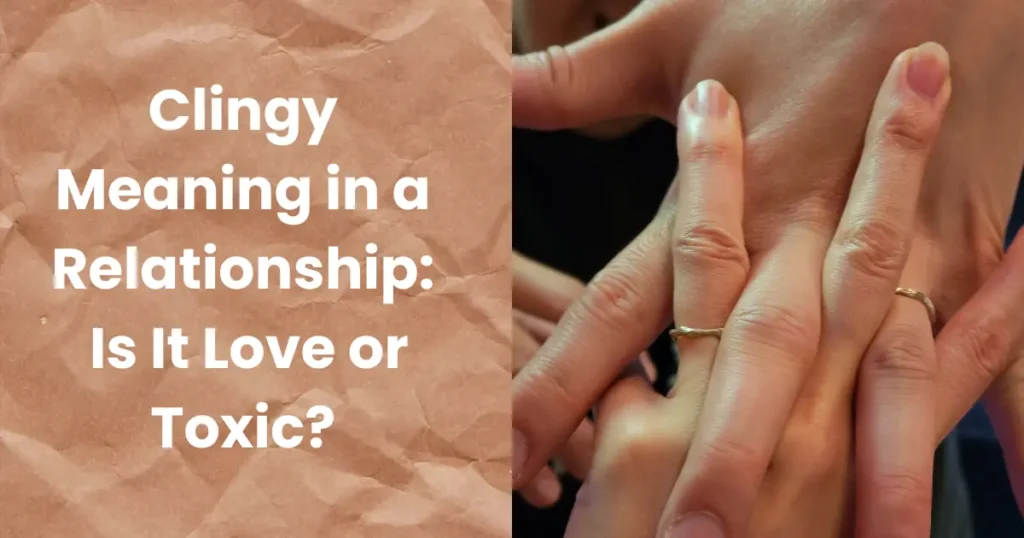It’s natural to want love, closeness, and connection in any relationship. But when that desire becomes emotional dependency and constant neediness, it may cross into clingy behavior.
In this article, we will help you understand the clingy meaning in a relationship, how to identify clinginess, what causes it, and most importantly, how to stop being clingy in a relationship. We will also explore whether being clingy is always bad and how to maintain healthy love with independence.

What Does “Clingy” Mean in a Relationship?
Clingy meaning in a relationship refers to a person who constantly needs attention, affection, or reassurance from their partner. This behavior is often rooted in insecurity or fear of abandonment.
Definition of Clingy in a Relationship:
Clinginess means becoming overly dependent on your partner for emotional support or validation, making them feel overwhelmed or suffocated.
“Clinginess is when one person’s need for closeness becomes so demanding that it stifles the other person’s ability to have their own life and space.” — Dr. Jane Greer
Is Being Clingy Good or Toxic in a Relationship?
While it might come from a place of love or fear, being clingy can often become toxic.
Here’s why the clingy behavior can harm a relationship:
- Emotional exhaustion for both partners
- Loss of personal space and individuality
- Jealousy and controlling behavior
- Constant arguments and misunderstandings
A 2023 study in the Journal of Social and Personal Relationships found that perceived neediness and excessive demands were major causes of relationship dissatisfaction.
That said, occasional need for reassurance is normal. The problem arises when it becomes obsessive or unbalanced.
Related read: How to Get Out of a Toxic Relationship Before it Breaks You – 7 Steps
Signs of Being Clingy
Recognizing clingy behavior is important to fix it. Here are some clear signs of the clingy meaning in a relationship:
- Constant texting or calling when apart
- Getting anxious if your partner doesn’t reply quickly
- Needing to spend all free time together
- Getting jealous of your partner’s friends or social life
- Over-analyzing interactions or looking for hidden meanings
- Seeking constant reassurance about love or loyalty
- Not respecting your partner’s personal boundaries
- Dropping your own hobbies or friends to be with your partner
Causes of Clinginess in Relationships
Clinginess doesn’t appear without reason. Here are the most common causes of the clingy meaning in a relationship:
1. Low Self-Esteem
You might feel you are not “enough” and need constant validation.
Read more: How to Build Self-Esteem: A Guide to Confidence
2. Fear of Abandonment
Past experiences of rejection or trauma may trigger a fear of being left alone.
3. Anxious Attachment Style
This type of attachment makes people crave closeness and fear rejection.
According to attachment theory, these patterns often develop in early childhood and deeply influence how a person bonds in adult relationships. Someone with an anxious attachment style may struggle to trust that their partner genuinely cares for them, leading to clingy behaviors and emotional overdependence.
A 2016 study published in the Journal of Contextual Behavioral Science confirmed that individuals with anxious attachment tendencies show significantly higher levels of emotional dependency in romantic relationships. Source: ScienceDirect
4. Lack of a Personal Life
No hobbies or social life outside your relationship can lead to unhealthy dependency.
5. Misconceptions of Love
Some think true love means being together all the time, which is not true. Healthy love includes space.
6. Poor Communication
When feelings and needs aren’t expressed well, they can show up as clingy actions.
How to Avoid Being Clingy in a Relationship
Want to create a stronger, healthier connection? Here’s how to stop being clingy:
1. Practice Self-Awareness:
Reflect on your triggers. Ask yourself: Why do I feel anxious when they’re not around?
2. Develop Your Own Identity
- Pick up hobbies you enjoy
- Spend time with friends and family
- Set personal goals and celebrate achievements
3. Work on Your Self-Esteem
- Practice self-love and self-talk
- Avoid comparing yourself to others
- Remind yourself: You are enough.
4. Respect Boundaries
Give your partner space to breathe, relax, and enjoy their own life.
5. Communicate Openly
Share how you feel without demanding constant attention.
“The road to healthy love begins with a deeper understanding of ourselves.” — Therapist Ken Page
6. Learn to Be Comfortable Alone
Enjoy your own company. Watch a movie solo, read a book, or go for a walk.
Related read: Mindfulness for Personal Growth a Transformed Personality
7. Seek Therapy if Needed
If clinginess stems from trauma or deep fears, therapy can help you develop better coping skills.
Example of Clingy Behavior in a Relationship
Example 1:
Your partner is at work, and you call or text them five times in an hour asking what they’re doing.
Example 2:
They plan a weekend with their friends, and you get upset or feel unloved because you’re not included.
Example 3:
You cancel your plans with friends every time your partner is free, even when you had something else planned.
These behaviors reflect emotional overdependence and can damage your relationship over time.
Conclusion: Love Without Losing Yourself
Understanding the clingy meaning in a relationship is essential for developing emotional maturity and trust. Clinginess usually comes from a place of fear, but with awareness and growth, it can be transformed.
A strong relationship is built on love, trust, space, and independence. By recognizing the signs of clinginess, addressing its causes, and taking steps toward self-growth, you can create a partnership that is healthy, happy, and long-lasting.
“Distance means so little when someone means so much.”
Read More on Medium: Clingy Meaning in a Relationship?

